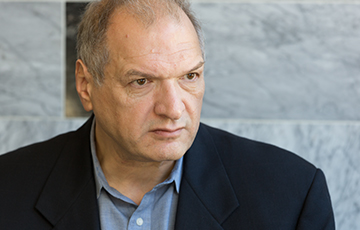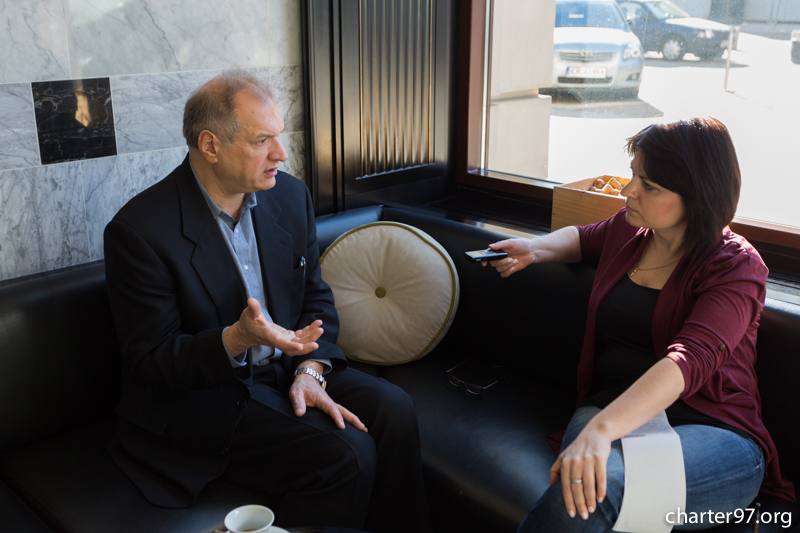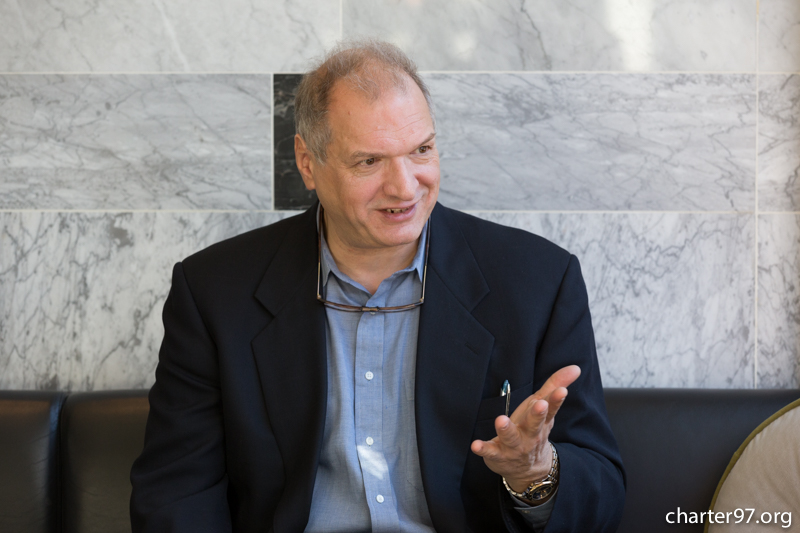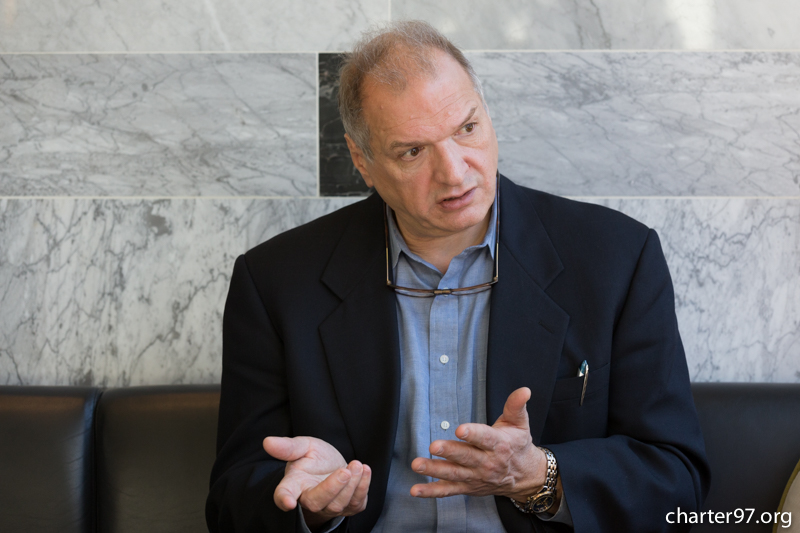Yuri Felshtinsky: Afghan variant of ousting Lukashenka is possible in Belarus
122- 24.02.2015, 9:02
- 263,851

The Minsk agreement is Putin's ruse of war.
Famous Russian-American historian Yuri Felshtinsky, the author of the books Blowing Up Russia: Terror from Within and The Corporation. Russia and the KGB in the Age of President Putin, met with chief editor of charter97.org Natallia Radzina in Warsaw and answered her questions.
– The Minsk agreements over Ukraine were called by some western experts a “bandit scenario”, meaning that their main beneficiary is Vladimir Putin. If so, why does the world takes its lead from the bandit?
– The bandit scenario is a very simplified understanding of what is happening. Frankly speaking, I wouldn't label Putin as “thief” or “bandit”. As a historian, I am against calling Lenin, Trotsky and Stalin killers and bandits. These epithets do not explain the sense of events.
The matter is not that Putin is a thief or a bandit. It is a narrowed uninteresting category. It would be too easy if Putin were just a thief or a bandit. But it is not so. Putin worked for the KGB. He came to power as a KGB representative. He and the KGB control whole Russia now. He has maybe a rather amorphous but nevertheless rather clear programme. He knows well what he wants.
– So, what does Putin want?
– It is very important to note that Putin doesn't think of himself as a thug, bandit or thief. He is sure that everything he does is right for Russia. The current events are rather a complicated phenomenon that something accidental.
What does Putin want? I think he's said a lot lately, beginning from March 2014 when Crimea was occupied and he showed his true colours. One of his most important theses is the statement that the dissolution of the Soviet Union was the biggest tragedy of his life. It became clear that he thinks the collapse of the USSR was the reason for Russia's all problems.
He then generated a new idea of the “Russian world”, which main point is that the Russians have a “Russian gene” that differs them from the rest of the world.
The President of the Russian Federation then called himself a Russian nationalist. It is a cause for concern when the president of the multinational state says he is a Russian nationalist.
– But you say Russia is not a federation but an empire.
– That's right. And this is the problem. The Russian Federation is still an empire, a reduced copy of the old Soviet Union. It is a transition form that has three options: leave everything as it is, restore the empire or get rid of the remains of federalism and make Russia only Russia.
Of course, Putin chose the restoration of the empire. It doesn't matter how the empire will be called: the Russian Federation, the Russian Empire or the Soviet Union.
I mention the Soviet Union on purpose. In September 2014, the Russian information agency ITAR-TASS received its old name TASS. It is interesting and illustrative. It coincides with the replacement of the anthem written by Glinka with the old Soviet anthem. They return old symbols because Putin wants to restore the Soviet Union to the best degree possible in the current geopolitical situation.
It just happened so that they started with Ukraine. I'd like to stress that the Euromaidan protests were the result of Putin's activity, because the revolution began after Yanukovych refused from the rapprochement with the EU under pressure from Russia and for a big bribe.
If events developed in another way, the restoration of the empire would have started with Belarus. I think that if Putin made any serious strategic mistakes, one of them is that he began to restore the empire with Ukraine instead of Belarus. Belarus could have been annexed on the Crimean variant.

– Belarusians are afraid of this variant.
– The annexation will look differently today. It wouldn't be a quiet annexation for the rest of the world. It would be a forceful occupation and reaching NATO's eastern border – the Baltic States and Poland. Taking into account that Putin expressed his intentions through a military confrontation, it would mean a march on the West.
No one would believe that Putin wants to annex only Belarus. It will be clear that the annexation of Belarus is a strategic maneuver for further assault on Central Europe.
– Let's go back to the Minsk agreement. Is it really Munich-2?
– The Minsk agreement is, fortunately or unfortunately, a ruse of war. I don't think the agreements will be observed. It was organised in such a way that Ukraine, France, Germany and even separatists undertook commitments, but Russia didn't undertake any commitments. In this sense, the signing of the Minsk agreement is absurd and pointless because all understand that Russia is the main player in the conflict situation.
If the world wants to resolve the conflict, the only way to do it is to make Russia a responsible party under the agreement. But what we have now is that Ukraine has commitments, the Donesk and Luhansk “republics” have commitments, France and Germany guarantee something, but Russia has nothing to do with it. At the same time, we know that Russian military forces fight in Donbas. This cat-and-mouse game guarantees that the conflict will never end.
The agreements are absolutely unprofitable for Ukraine. The Ukrainian government actually agreed with the fact of the formation of the Donetsk and Luhansk “republics” within the Ukrainian state. It creates a dangerous buffer zone, a lodgement for the incursion of Russian troops deeper into Ukraine.
The most absurd clause of the agreements is a financial one. The Ukrainian government undertook commitments to restore Donetsk and Luhansk, pay for social programmes in the blatantly hostile territories controlled by Russia. You cannot imagine anything more absurd.
– Is it possible that Putin wants not a world war but only a destabilisation in Ukraine to control its territory?
– No one knows the answer. What will Putin do? What are his plans? We have two or three scenarios of further developments.
The initial plan of the annexation of Ukraine has failed. The plan was that Ukraine must have been annexed by Russia by September 2014. After a year of war, Russia has only Crimea and Luhansk and Donetsk as bleeding wounds. Russia can stop here and achieve a serious aim for Putin – to prevent Ukraine from joining the EU.
The other matter is the cost. The whole civilised world understands that Putin is a dangerous dictator who came to power in a big country. Russia now poses a real threat to the world.
Of course, the West's reaction is weak, sanctions are not effective, but NATO begins to make some steps. The attitude towards Putin has changed. It coincides with the decline in oil prices. The Russian ruble dropped twofold.
It is the price paid by Putin for creating his and Russia's negative image. Maybe the conflict works for peace in the world. Maybe the Russian-Ukrainian conflict will help Europe insure itself against a big war.
– Chamberlain and Daladier also thought they would prevent a war by reaching an agreement with Hitler.
– That's absolutely true. We will recall these talks every time we see that the Minsk agreements are not observed by Russia. If the Russian army launches a full-scale offensive on Ukraine in spring or summer 2015, we will say that the Minsk-2 agreement was the Munich Pact.
We will know it for sure when we see that it was short break for Putin before full-scale combat operations.
– You said Putin is a dictator. On the other hand, you say in your book The Corporation. Russia and the KGB in the Age of President Putin that he is a an appointee of the secret service. It occurs that Putin is the dictator under control, doesn't it?
– There's no contradiction. Putin is an appointee but not a stooge of the secret services. He is a representative of the system. The FSB, the former KGB, came to power through him.
There is a story that was once shown on TV. When Putin was a prime minister, he made a speech to his former colleagues on the occasion of the Day of Secret Services. He said what was considered to be a joke by all, but I understood even then that he was speaking seriously. Putin said the first task of seizing power under the cover of the PM post was fulfilled.
Putin really seized power under the cover. It was the initial task of the KGB and it was fulfilled completely in 2000. The secret services were focused on this task – to have their president. It could have been Primakov, then director of foreign intelligence chief, it could have been Stepashin, then director of the Federal Counterintelligence Service. Putin was third in the queue, but he was lucky.
We have been asking ourselves for 14 years why he gives key posts to FSB officers. We now understand why. Because the system was being tuned from 2000 to 2014.
– The system was being tuned also by the example of Belarus. Putin was supporting his puppet Lukashenka and observing how he was usurping the power avoiding strong reactions from the West. Russia then began to deal with the Russian opposition in the way Lukashenka does it in Belarus.
– I understand why you see parallels. But the matter is that Lukashenka is a traditional and independent dictator.

– How can he be independent if he has been financed by Moscow for more than 20 years?
– We are speaking about the “birth” of the dictatorship. Who was Lukashenka? A kolkhoz director. It's clear that he rests on the KGB and Russian money. But he didn't came to power with the help of the agency he now represents.
– So, he is “self-made” but not independent.
– (laughs) In a certain degree. He is a sole dictator. This is, to some extent, his strength and, to some extent, his weakness. It is very easy to struggle against dictatorial regimes. You just need to overthrow a dictator, and the whole structure will collapse.
Unfortunately, it is not so with Putin. I am deeply convinced that nothing will change after he quits. Other people from the same group will come to power. They will be not worse and not better. They will continue to do what Putin started in 2014.
The problem is more horrible, because what Putin now does through the war with Ukraine is not just an attempt to gain territories for his empire. It is an attempt to return to the Soviet Union. If you watch Russian TV, read Russian newspapers and talk to Russian people, you will find out how surprisingly quickly they returned to the USSR and feel comfortable.
– Living in the new Soviet Union is unlikely to be as comfortable as before, taking into account serious economic problems that Russia has faced.
– Yes, Russia feels the effect of economic problems but the country has accumulated “subcutaneous fat” in the recent years. It won't feel strong economic pressure for the first few years. It's clear that people will cut expenses and won't travel abroad as often as they did before. Yes, some products have disappeared due to sanctions, but people can get used to it.
Will it cause a decline in Putin's popularity? Surely. Will we know it? Maybe not, because popularity and approval ratings can only be discussed in free countries. It would be at least not scientific to seriously discuss the approval rating of the dictatorial president in the country without freedom.
Putin's approval rating will of course fall also due to the war in eastern Ukraine. A bloody war cannot raise his popularity. But he doesn't worry about it because the Kremlin's policy does not depend on what people think. It is an absolutely Soviet system. The government rules as it wants and Soviet people live on their own.
The opposition does not have tools to influence the authorities. Theoretically, the only thing they can do is to start a revolution. We may regret it or not, but Russia is not the country where people take to streets. I think Putin feared Maidan protests in vain if he did.
– You and Alexander Litvinenko wrote the book Blowing Up Russia: Terror from Within, in which you claimed that the Russian apartment bombings of 1999 were carried out on the order of the authorities. In 2011, people were killed in the Minsk metro bombing. It happened during the serious fall of the Belarusian ruble, the growing discontent among people and upcoming trials against the opposition leaders. According to opinion polls, most Belarusians do not believe that an electrician and a lathe operator, who were labeled as terrorists, were guilty. Is organising terrorist attacks a common method for dictators to retain the power?
– What do we know about the explosions in Russia? Terrorist attacks were carried out ahead of the presidential elections in 1996 and 2000. It caused the Chechen wars. The aim of the wars was to create the situation when the government could have an opportunity to cancel or postpone the elections explaining it with an emergency situation in the country. The elections would have been cancelled if Yeltsin hadn't won in 1996 and Putin hadn't won in 2000. The wars were the instruments that helped seize power in Russia.
We need to think why Lukashenka needed the terror attacks. In Russia, the terrorist attacks were something bigger than an ordinary terrorist attack, which the opposition could have been blamed for.
It could have been a deceptive maneuver in Belarus. It is a rather common practice of security services.
– In you opinion, how can events develop in Belarus in the near future? Another sham election is held in the country in 2015.
– Putin must make an attempt to seize power in Belarus. I think it's on his agenda. There are several options.
Option 1: Lukashenka will be proposed to join the Russian Federation and allow the annexation of Belarus. He will remain the de facto head of the republic, but the country will lose its independence.
Option 2: The same without Lukashenka's consent. Russia will just send its troops to the country and Lukashenka will not have a choice.
Option 3: Lukashenka will be ousted on the Afghan scenario, when president Amin was removed by Soviet troops who entered the country on his proposal. The Soviet leadership feared Amin would take the side of the US.
It's not a problem for the Kremlin morally politically or technically to oust Lukashenka. Lukashenka is known in Europe as a dictator whom nobody likes. Putin is his only possible ally. But he cannot be a real ally. It is the most senseless thing to trust Putin.
The question is what alternatives Lukashenka has. I think he doesn't have any. If we suppose that he sincerely decides to become an ally of Europe and the US and becomes a pro-western president, he will lose his power. Firstly, the tension that has been accumulated for many years always lead to explosions when dictatorial regimes choose a path of liberalisation. Secondly, such Lukashenka's policy will be regarded by Putin as a provocation. It will be an excuse for an immediate aggression against Belarus.
So, I think the Ukrainian conflict, which was started by Putin, will give a very important impulse to significant changes in Belarus. What concerns the date, it will happen in 2015.










